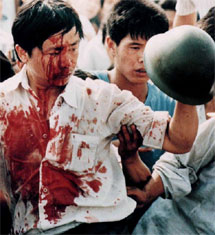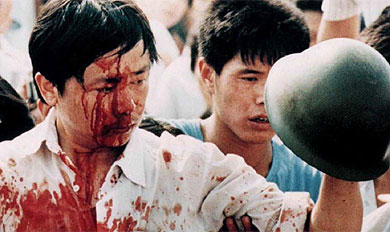The Tiananmen Mothers, the group who today remembers the death of students in central Beijing 22 years ago, has announced that the Beijing government would be considering the possibility of buying the silence of the families of the victims. The group has documented the deaths of 203 citizens who demanded political reforms and freedoms that morning from 3 to June 4, 1989, but believes that many more could lose their lives at the hands of the People's Liberation Army.
In the past it had been rumored about possible financial arrangements between authorities and families where unofficial and in secret, but it is the first time 'mothers' made public the details of a tender. According to the group, it was flatly rejected because the proposed compensation is not accompanied by an explicit recognition of the facts, let alone an official apology.
In its annual open letter, 127 families contacted officials explained that one of the families in February and April this year presented a "personal capacity" and not as representatives of an official institution. The goal of staff, tells the group, was both what the amount would "resolve the issue." "We want the truth, not the money," writes the leader of the Mothers, Ding Zilin.
"The murder of members of our families was an act committed by the government, and any proposal to resolve this tragedy with money, and besides it surreptitiously, it is an insult to our loved ones and an offense to our group." Like every year, security has increased the capital to prevent any expression of respect for the dead of Tiananmen.
Just a few days ago when a group of over a thousand of petitioners in Shanghai wanted to manifest in the central square of the capital. In China, the "petitioners" are those citizens in dispute with local authorities to come to the central government as a last resort for defense. The group also wanted to hold a vigil for students in a park in Shanghai, though security officers found the plans and scattering prevented the petitioners.
The usual intransigence towards expressions of discontent has been reinforced in recent months, since the call to replicate in China protests spread Jasmine Internet, but with little response on the street. A crackdown on dissent and repression of the more timid expressions of discontent have been ranked by advocacy groups for human rights as the heaviest offensive since the witch hunt unleashed Tiananmen in 1989.
For China Initiative, an NGO founded and led by some of those students who participated in the protests, "the same regime that perpetrated the massacre of students" carried out a systematic campaign of imprisonment, torture, disappearances and harassment of his own people to speak in favor of democracy.
" The group calls on the United Nations General Assembly that requires responsibilities to Beijing. Defenders of Human Rights in China (CHRD, in English), which posted a hundred citizens detained or harassed since February extended the call to replicate in China Spring Jasmine, "had never seen a level of so severe repression from the witch hunt that followed the June 4, 1989.
" The hardness of the offensive contribute then the proximity of sensitive dates for the Communist Party of China. On July 23, 1921, 90 years ago, held its founding congress in Shanghai (the official anniversary date, by a memory error attributed to the founder of the Party, Mao Zedong, however, is the first of July).
In addition, next year is a delicate relief provided the leadership that often lead to infighting and maneuvering within the party pressure to bring instability. "The government is more uncertain in power since 2008, and protests in the Middle East and North Africa, meant to be proactive in taking action before the rapture occurs," says a ELMUNDO.
Wang is Songli. For CHRD researcher, inflation, corruption, or lack of freedom of expression and information continue to push China's society today, even more severe than two decades ago in Tiananmen. "In China there are very indignant, but the government does very good job of isolating and containing it," says Wang According to Greenpeace, 16 activists still held from the 48 recorded in four months.
Seven of them have been charged and one has already been sentenced. Nor has heard from 12 of the 22 missing illegally, without a formal arrest. Torture and degrading treatment have been "routine" as CHRD. Tiantian Li, a Shanghai lawyer specializing in human rights cases, recently told how her captors abused and interrogated about their sex life, also by using threats and blackmail to her partner and family. 


In the past it had been rumored about possible financial arrangements between authorities and families where unofficial and in secret, but it is the first time 'mothers' made public the details of a tender. According to the group, it was flatly rejected because the proposed compensation is not accompanied by an explicit recognition of the facts, let alone an official apology.
In its annual open letter, 127 families contacted officials explained that one of the families in February and April this year presented a "personal capacity" and not as representatives of an official institution. The goal of staff, tells the group, was both what the amount would "resolve the issue." "We want the truth, not the money," writes the leader of the Mothers, Ding Zilin.
"The murder of members of our families was an act committed by the government, and any proposal to resolve this tragedy with money, and besides it surreptitiously, it is an insult to our loved ones and an offense to our group." Like every year, security has increased the capital to prevent any expression of respect for the dead of Tiananmen.
Just a few days ago when a group of over a thousand of petitioners in Shanghai wanted to manifest in the central square of the capital. In China, the "petitioners" are those citizens in dispute with local authorities to come to the central government as a last resort for defense. The group also wanted to hold a vigil for students in a park in Shanghai, though security officers found the plans and scattering prevented the petitioners.
The usual intransigence towards expressions of discontent has been reinforced in recent months, since the call to replicate in China protests spread Jasmine Internet, but with little response on the street. A crackdown on dissent and repression of the more timid expressions of discontent have been ranked by advocacy groups for human rights as the heaviest offensive since the witch hunt unleashed Tiananmen in 1989.
For China Initiative, an NGO founded and led by some of those students who participated in the protests, "the same regime that perpetrated the massacre of students" carried out a systematic campaign of imprisonment, torture, disappearances and harassment of his own people to speak in favor of democracy.
" The group calls on the United Nations General Assembly that requires responsibilities to Beijing. Defenders of Human Rights in China (CHRD, in English), which posted a hundred citizens detained or harassed since February extended the call to replicate in China Spring Jasmine, "had never seen a level of so severe repression from the witch hunt that followed the June 4, 1989.
" The hardness of the offensive contribute then the proximity of sensitive dates for the Communist Party of China. On July 23, 1921, 90 years ago, held its founding congress in Shanghai (the official anniversary date, by a memory error attributed to the founder of the Party, Mao Zedong, however, is the first of July).
In addition, next year is a delicate relief provided the leadership that often lead to infighting and maneuvering within the party pressure to bring instability. "The government is more uncertain in power since 2008, and protests in the Middle East and North Africa, meant to be proactive in taking action before the rapture occurs," says a ELMUNDO.
Wang is Songli. For CHRD researcher, inflation, corruption, or lack of freedom of expression and information continue to push China's society today, even more severe than two decades ago in Tiananmen. "In China there are very indignant, but the government does very good job of isolating and containing it," says Wang According to Greenpeace, 16 activists still held from the 48 recorded in four months.
Seven of them have been charged and one has already been sentenced. Nor has heard from 12 of the 22 missing illegally, without a formal arrest. Torture and degrading treatment have been "routine" as CHRD. Tiantian Li, a Shanghai lawyer specializing in human rights cases, recently told how her captors abused and interrogated about their sex life, also by using threats and blackmail to her partner and family.



- Wikileaks Cables Say No Bloodshed Inside Tiananmen Square (05/06/2011)
- Tiananmen Square anniversary draws huge crowds (05/06/2011)
- Tiananmen Square anniversary draws huge crowds - CBC.ca (05/06/2011)
- Tiananmen anniversary brings China detentions (04/06/2011)
- Did the tanks of Tiananmen bring stability to China, or store up trouble for the future? (31/05/2011)
No comments:
Post a Comment